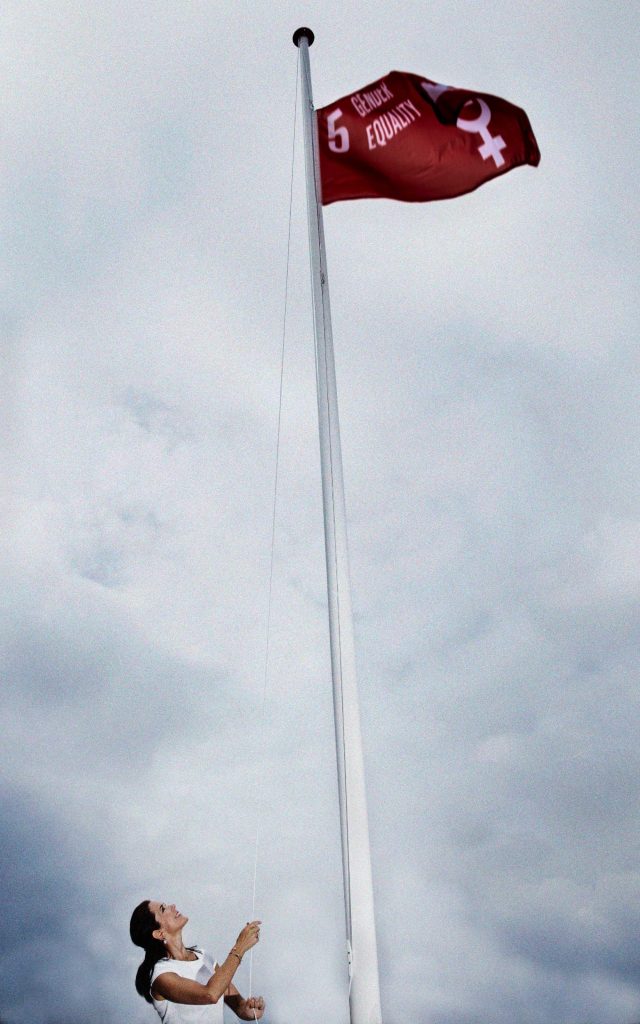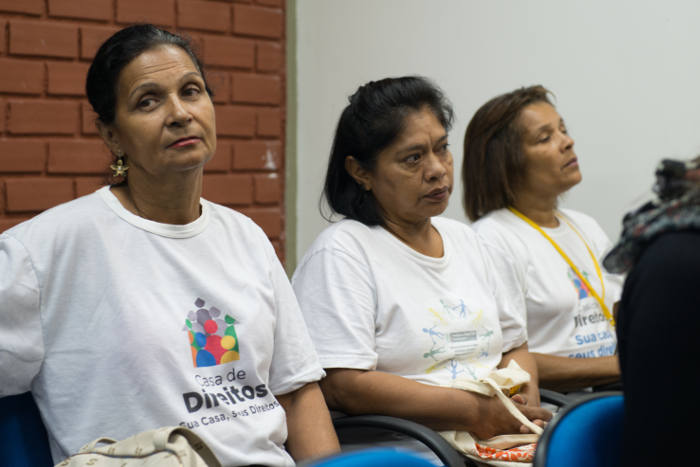-
|
25 November 2020
|Posteado en : Reportage
The 25 of November is the International Day for the Elimination of Violence against Women. At the International and Ibero-American Foundation for Administration and Public Policies (FIIAPP), we took a look at the situation worldwide and the role of international cooperation with the gender specialist, Cecilia Güemes.
Approximately 15 million teenage women (15 to 19 years old) around the world have suffered forced sexual relations at some point in their lives according to UNICEF. Globally, one in three women has suffered physical or sexual violence, mainly from an intimate partner, according to the UN . A total of 72% of all victims of human trafficking globally are women and girls and four out of five women victims of trafficking are used for sexual exploitation according to UNODC. In addition, at least 200 million women and girls between the ages of 15 and 49 have been subjected to female genital mutilation in 30 countries where representative data is available according to UNICEF.
Faced with this reality, 25 November is the International Day for the Elimination of Violence Against Women. A specific type of violence that is exercised against women due to the mere fact that they are women: ‘Violence against women is not something some group made up – it refers to a specific type of violence directed at women and based on historical structural factors and the construction of roles where control, domination, and invisibility or the assignment of a specific role in the social representation of women is sought’, according to the president of the Research Group on Government, Administration, and Public Policy (GIGAPP), Cecilia Güemes.
A doctor in political science and a lawyer, Güemes’s career has been spent in the field of research in matters such as social and political trust, public policies, and social cohesion. In addition, she collaborates with the Carolina Foundation and is the author of publications such as ‘Women in Ibero-America: Government Tools for a Change that Has Already Begun’ and ‘It will be Law.The Fight for the Legalisation of Abortion in Argentina’.
For this specialist, public institutions play a key role in combating gender-based violence, something reflected in the commitments adopted in 2015, when 193 countries pledged to work towards compliance with the 2030 Agenda and its 17 Sustainable Development Goals. The fifth Sustainable Development Goal (SDG) is to achieve gender equality and empower all women and girls. With this in mind, this SDG establishes a number of targets such as eliminating all forms of violence against all women and girls in the public and private spheres, including human trafficking and sexual and other types of exploitation and approving and strengthening sound policies and applicable laws to promote gender equality and the empowerment of all women and girls at all levels. According to Güemes, concrete actions of governments affect and shape social reality, so she defends the need for women and the gender perspective to be part of policy-making, that the gender perspective be integrated into all government actions and all areas, ‘not only that there are specific institutions dedicated to gender issues’, but that a budget be allocated to design, implement, and evaluate policies with a gender perspective and, finally, that civil servants in charge of managing the public be trained in the gender perspective.
The FIIAPP’s Commitment
The FIIAPP, as a cooperation agency that works closely with public institutions, is aware of the role of the Foundation in promoting collaboration between different social agents to create an environment of peace and sustainable development, from a gender perspective. This approach is applied from programmes funded by the European Union in various sectors such as security, the fight against human trafficking, access to justice in an inclusive way, the fight against corruption, and the mitigation of climate change. Programmes such as EUROsociAL+, a programme managed by FIIAPP in collaboration with other European agencies, are prioritising the gender approach in their action plans.
This is also the case of the EUROCLIMA+ programme in Latin America, through which the integration and involvement of women in policy-making and decision-making regarding the effects of climate change are sought. They are not, however, the only projects that apply the gender perspective. European programmes such as EL PAcCTO and A-TIPSOM , which fight organised crime in Latin America and human trafficking in Nigeria, respectively, also apply working methods based on gender equality.
In this way, the FIIAPP reaffirms its commitment to eradicating violence against women and the key role of cooperation to combat this problem, something which Güemes agrees with: ‘International cooperation is key insofar as it is capable of contributing with economic, human, and cognitive resources to the development of public policy, in monitoring and evaluating actions, and in the use of best practices, especially in societies that are resistant to these topics, where social roles are normatively established’.
Reading to raise awareness this 25N
‘There are lots of books that I would recommend where you get a peek at the change of era and in which the external and internal struggles that occupy women today are portrayed’, explains this Carolina Foundation collaborator. ‘Two Argentine authors that I really liked are Luciana Peker (Putita golosa and La revolucion de las hijas) and Tamara Tenenbaum (El fin del amor). I also recommend following her work on social media’.
In and from Europe, Güemes recommends Vanessa Springora’s recent work, Consent. ‘I liked it a lot as it reveals the hypocrisies and contradictions in Western societies’.
Finally, regarding contemporary authors, the president of GIGAPP recommends reading women authors who describe the tensions suffered by women who seek to question or break with gender roles and contribute to the work, not only of deconstructing, but of building a new society in their stories. ‘Chimamanda Ngozi Adichie, Olga Tokarczuk, Siri Hustvedt, Jhumpa Lahiri, and Vivian Gornick, to name some of the ones I liked the most’, she concludes.
By Cristina Blasco, ( @cbm_cris ). FIIAPP communication team.
-
|
08 March 2018
|Posteado en : Reportage
Agenda 2030 counts on cooperation as a tool for advancing the gender equality that is being publicly demanded
“On International Women’s Day, we must commit ourselves to doing everything possible to overcome entrenched prejudices, support participation and activism, and promote gender equality and the empowerment of women”. These are the words of António Guterres, Secretary General of the United Nations, on International Women’s Day. Another 8 March for reflecting on what has been achieved and what remains to be done in terms of equality.
In 1995, almost 200 governments signed a historic road map in Beijing for achieving equal women’s rights. Two decades later, movements in favour of that equality continue to fill the streets and social networks throughout the world. In the face of this joint and global progress, international cooperation can be a key tool to achieving this equality.
Mar Merita, a technician specialising in gender with the EUROsociAL+ programme – which is funded by the European Commission and managed by FIIAPP – affirms how much innovation has taken place regarding the role of women in the Agenda 2030 framework for cooperation.
From ensuring that children have an equitable and high quality education, through ending all forms of discrimination and violence against women and girls throughout the world, to making equality one of the Sustainable Development Goals (SDG) established by several world leaders for a better world in 2030.
Equality in the EU
Gender equality is also one of the founding values of the European Union, which closely follows these development objectives. It also analyses progress towards these objectives through a periodic study.
The latest one (Sustainable Development in the European Union, 2017) provides data on four specific areas that serve as indicators when evaluating the goal of equality: gender violence, access to education, employment and positions of responsibility.

Gender violence is a reality in the EU in 2012. Where one in three women say they have experienced physical or sexual violence since they were 15 years old. This problem is the cause and consequence of inequality, and the fight against it begins the moment children gain access to education.
However, the fact that men drop out of school earlier and women are more successful in this area is not reflected in the employment rate of recent graduates, which is higher for men. In addition, the proportion of men of working age in employment exceeds that of working women by 11.6%.
Employment is one of the areas that is most linked to gender roles, family responsibilities and traditions. And it is reflected in the wage gap: in 2015, according to the same study, women earned 16.3% less per hour than men. The same difference as 5 years ago.
Progress has a cost in what Mar calls the “third generation of rights”, which would include this difference in wages that continues to be significant in most countries. According to the expert from EUROsociAL+, despite the progress in the recognition of political rights, there is still work to be done regarding social, cultural and economic rights; through which that “real equality” would be achieved.
The distribution of political positions and positions of responsibility also reflects inequality, since women do not usually have as much representation as men in decision-making processes. While the proportion of seats held by women in national parliaments has increased since 2003, women still held less than one third (28.9%) of these seats in 2017.
Cooperation as a tool
Many of these issues, such as the wage gap and sexual harassment, are the focus of current events. These have included public denunciations, with a strong international impact, which nevertheless need “processes for dealing with these problems”.
Dominique de Suremain, coordinator of the gender equity policy area for the EUROsociAL+ programme, believes she sees “less visible work for change” when these demands materialise and are reflected in the system.

This is where cooperation comes into play, it has an essential role in the implementation of public policies that take these demands into account. It is important, according to Dominique, “to introduce that concern into the design of the projects” from the outset. It is a cross-cutting issue that must not only be applied in social projects, but it is also relevant for all the themes.
An example would be the gender focus workshop organised by ARAP Ghana – an anti-corruption project managed by FIIAPP – or the inclusion of this perspective in the activities of Euroclima+. In the end, inequality is inherent in the society in which it occurs and it influences the problems that society addresses.
However, this approach is often insufficient to achieve real equality. We must go beyond the diagnosis, the indicators, to quantify how many women have benefited: “We must take advantage of cooperation projects in order to play a proactive role,” according to Dominique.
Perhaps for this reason, EUROsociAL+ is one of the first programmes to create an exclusive thematic area to address this problem. A strong gender component or axis that has direct actions and a team of people exclusively dedicated to it.
Cooperation is based on an exchange of experiences, which is also important for Mar Merita: “you can fight inequality by promoting examples and good practices that arise in countries”, by learning from each other.
“Equality is a universal cause” and a realistic objective that, within the framework of the projects, needs public policies in order to make practical progress. Although in the end what is really important, according to the expert, is to believe in it.
Listen to the programme dedicated to International Women’s Day on our space on Spanish National Radio







